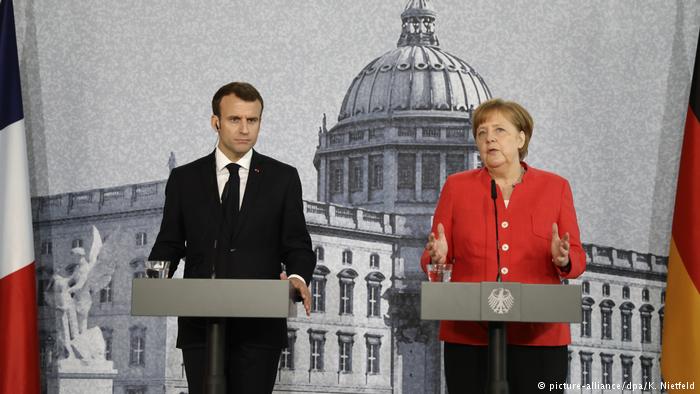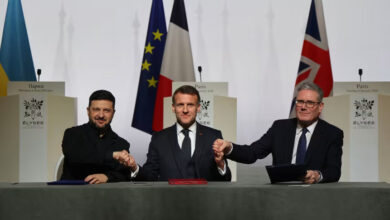
Chancellor Angela Merkel received her French counterpart on a building site in central Berlin on Thursday, and German media delighted in the symbolism.
Drenched in midday spring sunshine, Merkel showed President Emmanuel Macron around the Humboldt Forum, the new name for the Berlin Palace, a royal Prussian edifice that is being rebuilt and re-invented as a huge new museum in the heart of the German capital.
That was a cue for many media pundits to ponder: isn’t the European Union also a grand old institution due for renovation? Macron seems to think so: his speech in the European Parliament in Strasbourg on Tuesday set out the urgent need for reforms to the EU, specifically the retooling of its bailout mechanism to make it more flexible and independent in the event of a financial crisis.
We’re good together
The two leaders appeared before an image of the old imperial residence at the press conference following the tour, and ahead of the all-important talks expected to fill the afternoon. Predictably enough, Merkel and Macron were at pains to present a united front, with Merkel pointing out that the two countries were planning a joint council of ministers in late June.
“We need an open debate and at the end the ability to compromise,” Merkel said, before promising that an agreement would be reached by the summer – and warning that Europe could only represent its interests internationally as one. The pair also need to prepare European policies on asylum and immigration.
“You will notice we don’t lack work to do, and we don’t lack the will either,” said Macron, before seeking to reinforce his image as the centrist bulwark against the forces of populism in Europe. “We live in a moment of European adventure that is truly unique. Also within our states there are serious doubts and strong nationalistic visions.”
Merkel’s domestic pressures
But Merkel may not be as amenable to France’s plans as she would like: she faces domestic pressure – especially from her own Christian Democratic Union (CDU), whose conservative wing has been spooked by the rise of far-right populism and is especially sensitive about committing German taxpayers’ money to the EU.
Banking union
Macron is also pushing for an expanded European banking union that includes a deposit insurance scheme to protect savers. Germany is wavering on the issue. Last month, new Finance Minister Olaf Scholz praised Macron’s plans, but this month, the Social Democrat suggested that the insurance scheme won’t be realized in the near future. European banks must reduce their risks and get rid of their bad loans first — a position in line with Germany’s traditionally conservative fiscal policy.
We need to talk about Trump
The two leaders were also asked about their impending trips next week to visit US President Donald Trump in Washington, who has disrupted the usual harmony between the US and the EU with his talk of trade tariffs.
“We live in a time when there are differences,” Merkel answered carefully, “and of course we will discuss those differences, and today we will talk about how we will introduce the European perspective.” She then underlined how much she still valued the partnership with the US, which she described as a “great treasure, that I would like to nourish and cherish.”
“On the trade issues, I think I can say that we (Merkel and Macron) both believe in respecting the multilateral framework that the trade organizations represent and that the European Commission represents,” added the French president. “And I think we have common concerns and worries, especially when it comes to aluminum and steel surpluses being produced in China.”




